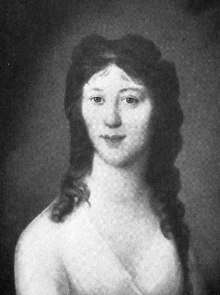Sophie Thalbitzer
Sophie Thalbitzer (née Zinn, 15 April 1774 – 27 December 1851)[1] was a Danish memoirist known for Grandma's Confessions (Danish: Grandmamas Bekiendelser),[2] which offers a rear first-hand account of everyday life for a child and young woman in an upper-class bourgeois family in Copenhagen during the late 18th and early 19th century. She was a daughter of the wealthy merchant Johann Ludvig Zinn and grew up in the Zinn House at Kvæsthusgade 3.[3] The building was listed on the Danish registry of protected buildings and places in 1959.[4]

Biography
.jpg)
Sophie Dorothea Zinn was born into a wealthy merchant family in Copenhagen, the daughter of Johann Ludvig Zinn and his wife.[5] She read many books and was particularly struck by Jean-Jacques Rousseau's Confessions.[6]
One of her father's business partners, Hinrich Ladiges, a wealthy sugar manufacturer who was 40 years her senior, proposed to her when she was 17 years old. Her father was strongly in favour of the liaison but she declined. She later married Henry Thalbitzer (1767–1818) who was Royal Prussian consul to Helsingør. She was widowed in 1818.
Grandma's Confessions
She wrote her memoirs after she became a widow at the age of 41. They were originally intended for their son Billy (Carl Wm. Thalbitzer) but later published under the name Grandmama's Bekiendelser.[7] They offer a first-hand account of everyday life as a child and young woman in an upper-class environment in Copenhagen during the late 18th and early 19th century.[8]
References
- "Sophie Thalbitzer". Dansk Kvindebiografisk Leksikon (in Danish). 22 March 2007. Archived from the original on 22 March 2007. Retrieved 2 March 2018.
- Thalbitzer, S.D.Z.; Clausen, J.; Rist, P.F. (1906). "Grandmama" bekiendelser.". Memoirer og Breve (in Danish). Gyldendalske boghandel, Nordisk forlag. p. 25. Retrieved 1 March 2018.
- Tönnesen, A. (1979). 233 danske borgerhuse (in Danish). Gyldendal. p. 45-. ISBN 978-87-01-54131-2. Retrieved 2 March 2018.
- "Fredede Bygninger Marts 2018" [Listed Buildings March 2018] (PDF) (in Danish). Slots- og Kulturstyrelsen. Archived (PDF) from the original on 3 March 2018. Retrieved 3 March 2018.
- "J.L. Zinn – Gyldendal". Den Store Danske (in Danish). 28 February 2018. Archived from the original on 28 February 2018. Retrieved 2 March 2018.
- Kjølbye, Bente (21 September 2010). "Mellem romaner og revolution". Politiken (in Danish). Archived from the original on 28 February 2018. Retrieved 2 March 2018.
- Bredsdorff, T.; Alenius, M. (1997). Digternes paryk: studier i 1700-tallet: festskrift til Thomas Bredsdorff (in Danish). Museum Tusculanums forlag. p. 46-. ISBN 978-87-7289-436-2. Retrieved 2 March 2018.
- Vibæk, J. (1985). Reform og fallit: 1784–1830. Danmarks Historie (in Danish). Politikens Forl. p. Den yndige og velbegavede Sofie Zinn, datter af indehaveren af Københavns næststørste handelshus, har i sine i nyere tid som »Grandmamas bekendelser« trykte memoirer levende fortalt om de franske jakobineres ophold i hovedstaden, om hvordan hun ved en fest for dem ganske ubevidst havde smykket sig med trikolorens farver, og ikke mindst om det indtryk en af dem gjorde på hende personlig ... have hørt Marseillerhymnen synge første gang således, for at kunne ... ISBN 978-87-567-3870-5. Retrieved 2 March 2018.